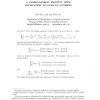Free Online Productivity Tools
i2Speak
i2Symbol
i2OCR
iTex2Img
iWeb2Print
iWeb2Shot
i2Type
iPdf2Split
iPdf2Merge
i2Bopomofo
i2Arabic
i2Style
i2Image
i2PDF
iLatex2Rtf
Sci2ools
76
Voted
DM
2006
2006
A combinatorial identity with application to Catalan numbers
By a very simple argument, we prove that if l, m, n {0, 1, 2, . . . } then l k=0 (-1)m-k l k m - k n 2k k - 2l + m = l k=0 l k 2k n n - l m + n - 3k - l . On the basis of this identity, for d, r {0, 1, 2, . . . } we construct explicit F(d, r) and G(d, r) such that for any prime p > max{d, r} we have p-1 k=1 kr Ck+d F(d, r) (mod p) if p 1 (mod 3), G(d, r) (mod p) if p 2 (mod 3), where Cn denotes the Catalan number 1 n+1 2n n . For example, when p 5 is a prime, we have p-1 k=1 k2 Ck -2/3 (mod p) if p 1 (mod 3), -1/3 (mod p) if p 2 (mod 3); and 0<k<p-4 Ck+4 k 503/30 (mod p) if p 1 (mod 3), -100/3 (mod p) if p 2 (mod 3). This paper also contains some new recurrence relations for Catalan numbers. Key words and phrases. Binomial coefficient; Combinatorial identity; Catalan number. 2000 Mathematics Subject Classification. Primary 11B65; Secondary 05A10, 05A19, 11A07, 11B37. The second author is responsible for communications, and partially supported by the National Science F...
DM 2006 | P-1 K=1 Kr | Paper | Simple Argument |
| Added | 11 Dec 2010 |
| Updated | 11 Dec 2010 |
| Type | Journal |
| Year | 2006 |
| Where | DM |
| Authors | Hao Pan, Zhi-Wei Sun |
Comments (0)

